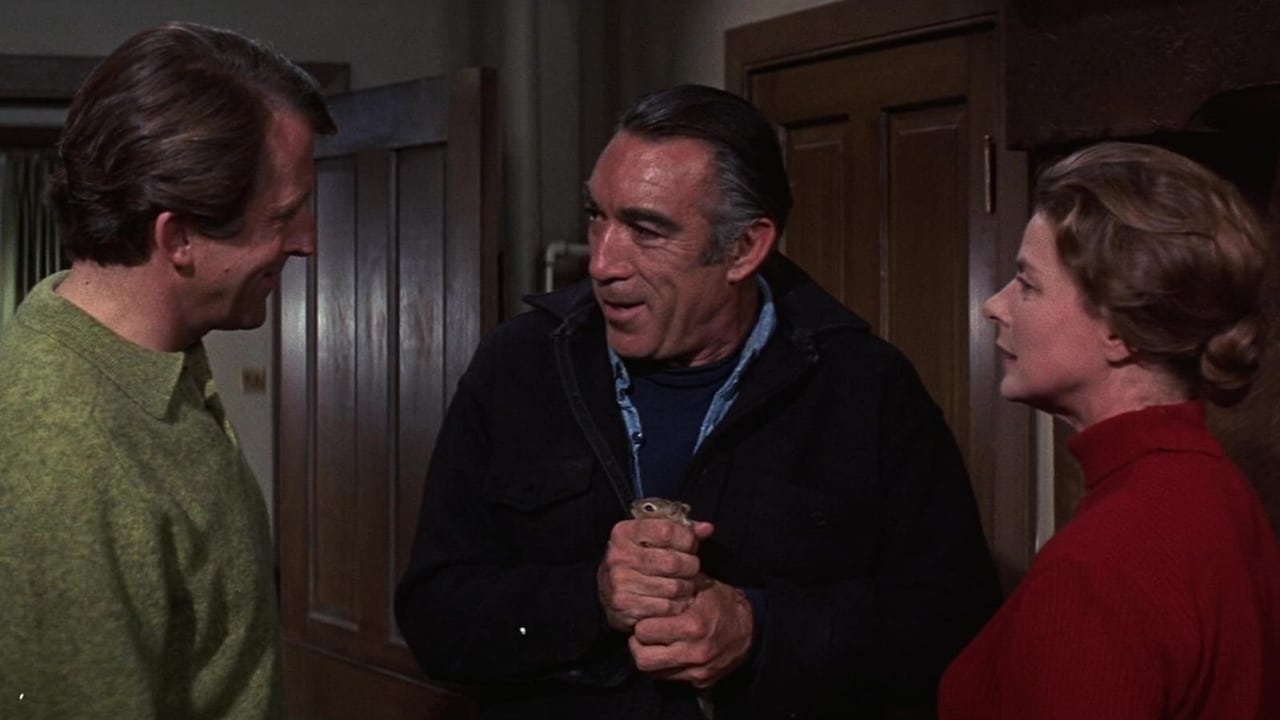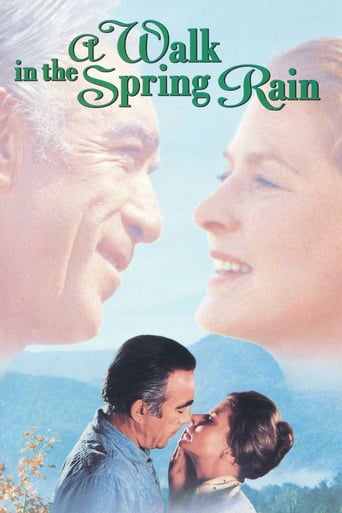

Very well executed
... View MoreFantastic!
... View MoreThe movie is wonderful and true, an act of love in all its contradictions and complexity
... View MoreThere is, somehow, an interesting story here, as well as some good acting. There are also some good scenes
... View MoreAdmirers of classic films will no doubt enjoy seeing Anthony Quinn reunited with Ingrid Bergman, his co-star from 1964's "The Visit"; they're an interesting screen match, but here, in 1970, with handyman Quinn talking in a southern drawl and matronly Bergman playing a professor's wife living on a farm in Tennessee, one cannot help but feel a sense of central dislocation. Bergman's husband (American actor Fritz Weaver) takes a year off from teaching to write a textbook, but instead stares at his typewriter, pipe firmly stuck between his teeth (his wife isn't frigid, but he is). It's no wonder then that Bergman enjoys Quinn's advances, but since they're both married--and have problems with their selfish children besides--it's hardly a December-age romance. Dreary melodrama, adapted from the book by Rachel Maddux, with clumsy exposition and even clumsier attempts to modernize an old formula. Charles Lang's cinematography is a visually jarring mix of location shots, back projection and ugly sets, while miscast Quinn is overly-friendly and solicitous (he makes the audience as uncomfortable as Ingrid's chilly spouse). While it's good to see the two stars together again, this Smoky Mountains scenario is a drag: colorlessly staged, poorly-conceived, predictable and depressing. ** from ****
... View MoreThe only "suspense" is whether Ingrid & Anthony will really hook up or not and be found out. The violence is the encounters between Anthony and his rebellious son, in the "I see .... you want to fight the old man eh" vein. It's more like a combo of The Bridges of Madison County and Li'l Abner, but infinitely worse ! Madison was more romantic and had better dialog and at least Li'l Abner had good tunes. Ingrid Bergman remains dignified throughout; Anthony Quinn is once again channeling Zorba, but with less gusto and a slow Appalachian drawl; Virginia Gregg as his wife, doing a bitter old Mammy Yokum impression, is the (unintended) comic relief, as is the"repartee" between the father and the rebellious son every time they meet. The only actor more or less perfect for the part is Fritz Weaver, a rather stodgy actor, in the type of part he often played in movies.Not a film that anyone involved can be proud of.
... View MoreIngrid Bergman goes with her husband Fritz Weaver, a college professor, off to the country in the winter in order for him to write a textbook. They are welcomed by Anthony Quinn, who takes an instant liking to her, despite the fact he's already married. And, the viewer can tell she likes the attention. In fact, she even encourages him. Due to her husband's absorption in his own world of writing the book, she has felt neglected, and Anthony succeeds in making her feel special.There's the usual feelings for each other and guilt involved: hello there; oh, no; well maybe; no no. But what makes this special is of course Ingrid Bergman's exquisite acting and the inspired casting of her and Quinn, who make a very passionate pairing. (They had been in "The Visit" together, but that was nothing like this.) Also, there's the subplot of his son not liking her at all and a total unexpected development.But, what makes this even more mature and realistic is the relationship between Ingrid and her daughter. She wants Ingrid to come home so Ingrid can babysit her grandson and she can finally follow her dream of going back to school to better herself. Obviously, Ingrid doesn't want to leave Anthony. Why should she leave, when she's so happy? The heated argument between them at the kitchen table, about the double standard for women and mothers and how they are fulfilled or not fulfilled by a devoted home life, isn't likely to be forgotten by the viewer, especially for mothers and daughters.Ultimately, what follows is handled very well and is likely to make a lasting impression on the film's female viewers. If you've never seen Ingrid take "A Walk in the Spring Rain," then treat yourself to this unknown and very underrated film of hers and enjoy the seasons with one of the best actresses ever.
... View MoreThis is an excellent film which I caught accidentally on a rainy afternoon on cable. A professor and his wife head to the appalachians for his 1-year sabbatical. They rent a house from Will Cade (Anthony Quinn), an overly-friendly, hospitable country bumpkin. Will from the very beginning makes comments about how pretty the professor's wife is, and that's just the beginning. While the absent-minded professor is lost in his own world, concerned about his career and completing his book, Will Cade seems to just have too much time on his hands and spends it making the professor's wife more familiar with the wonders of Appalachia. He brings her flowers from the countryside, buys her animals to keep her company, takes her to see the beautiful scenery. None of these are overt passes, but they all could be interpreted either way, which is part of the genius of the film: on the one hand, Will Cade really is doing a lot of things for this woman and anyone would be touched by them; he is extremely sincere. But on the other, there is something about him which makes you uncomfortable, maybe his over-familiarity with people he doesn't know. In this way, it's similar to Cape Fear since it indirectly says a lot about social class--the professor is overly intellectual, but passionless and emotionally handicapped, unable to think of others besides himself; while the country bumpkin is not wordly, but very genuine and giving. There are two other subplots involved a daughter of the professor and his wife, and the Will Cade's son, with whom he has conflicts which are never fully explained. Eventually, the woman gives in and kisses Cade, and I won't give away the rest of the story. But the mood of the film is very well set. There is a great scene at an appalachian country fair where Will is in rare form and the professor is clearly uncomfortable in this "culture" which he doesn't consider a "culture". The whole story is set in this haunting, appalachian environment, which is how it is similar to "Deliverance". There is that fantasy which urban dwellers have of the simple, personal country life, and then there's the in-breeding, backwardness, and so-on they are repulsed by. I highly recommend this film.
... View More